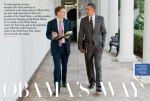Self-control is an exhaustible resource… Much of our daily behavior is more automatic than supervised, and that’s a good thing because the supervised behavior is the hard stuff. It’s draining.
We burn up self-control in a wide variety of situations: managing the impression we’re making on others; coping with fears; controlling our spending; trying to focus on simple instructions such as “Don’t think of a white bear”; and many, many others.
When people try to change things, they’re tinkering with behaviors that have become automatic, and changing those behaviors requires careful supervision by the Rider. The bigger the change you’re suggesting, the more it will sap people’s self-control.
Chip Heath & Dan Heath: Switch — How To Change Things When Change is Hard
—————
You only have so much decision-making energy. Use it very wisely.

This is one message that Michael Lewis learned from President Obama. (I have not yet read the full piece about President Obama by Michael Lewis. It is apparently only in the printed edition of Vanity Fair. But I heard the NPR snippet this morning, and I’ve read the summary teaser on-line at the Vanity Fair site). {Update — now available on-line: Obama’s Way by Michael Lewis). It is a lesson that I first learned from the Heath brothers in Switch. Well, maybe I first learned it from Bill Hybels, the Chicago-area pastor, who said in one of his sermons said that the secret to all success is “advanced decision making.”
“Learned” – at least in my head. I’m not sure I ‘ve fully learned it in my own decision-making life. But I have seen it at work recently, and I’m ready to sign on fully. My wife and I took a real, actual, leisurely vacation. We went to Charleston, and my wife, who is a great planner/organizer/list maker, researched, prepared, and typed a thorough day-by-day itinerary. I loaded it into my iBooks in both my iPhone and iPad, and we simply got up each day knowing what we would do that day – in advance! We had no “what would you like to do today” conversations. We had already decided. So, we simply enjoyed.
What the Heath brothers say in Switch is that every decision you make consciously, every decision you have to “think about,” drains a little of your attention, decision-making capability. You can end up unprepared, and not be at your best, for more serious decision-making because you already “spent that energy” focusing on lesser decisions.
So, this approach to life by President Obama sounds wise to me. And it is what Michael Lewis discovered and learned from President Obama.
Here are the excerpts about this from the NPR piece, and the Vanity Fair teaser:
(Vanity Fair):
“I’m trying to pare down decisions. I don’t want to make decisions about what I’m eating or wearing. Because I have too many other decisions to make,” he tells Lewis. “You need to focus your decision-making energy. You need to routinize yourself. You can’t be going through the day distracted by trivia.” Lewis says that if he were president he might keep a list in his head. “I do,” Obama adds. “That’s my last piece of advice to you. Keep a list.”
(NPR):
“He had very self-consciously sought to eliminate all trivial decision-making from his life, such as what he wears to work,” Lewis tells NPR’s Renee Montagne about his interviews with the president for his piece in the October issue of Vanity Fair. “So, he says, ‘I got rid of all the clothes I have except for gray suits and blue suits, so I don’t even have to think about what I put on.'”
Why? The president “started talking about research that showed the mere act of making a decision, however trivial it was, degraded your ability to make a subsequent decision,” Lewis says. “A lot of … the trivial decisions in life — what he wears, what he eats — [are] essentially made for him.”
So, how good are you at making decisions? One “trick” to learn is to make as many decisions as possible utterly routine, so that we can save our decision-making energy for genuine, serious decisions.
